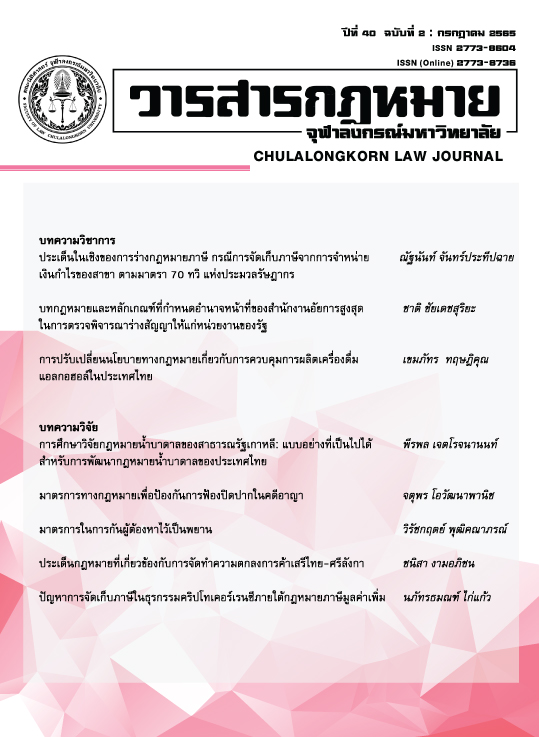การปรับเปลี่ยนนโยบายทางกฎหมายเกี่ยวกับการควบคุมการผลิตเครื่องดื่มแอลกอฮอล์ ในประเทศไทย
Main Article Content
บทคัดย่อ
ในปัจจุบันธุรกิจการผลิตเครื่องดื่มแอลกอฮอล์ถูกจำกัดไว้กับผู้ประกอบกิจการรายใหญ่ สภาพดังกล่าวเกิดจากกฎหมาย ระเบียบ และข้อบังคับของรัฐที่เกี่ยวข้องกับการผลิตเครื่องดื่มแอลกอฮอล์ ตลอดระยะเวลาหลายปีที่ผ่านมารัฐให้ความสำคัญกับการควบคุมการผลิตเครื่องดื่มแอลกอฮอล์โดยมีปัจจัยสำคัญ 2 ประการ คือ ในฐานะแหล่งรายได้ทางภาษี และในฐานะเป็นผลิตภัณฑ์ที่มีผลกระทบต่อสุขภาพของประชาชน โดยเหตุผลที่สองนั้นเป็นเหตุผลสำคัญที่ทำให้รัฐเข้ามาควบคุมในเรื่องคุณภาพการผลิตเครื่องดื่มแอลกอฮอล์ อย่างไรก็ตาม วิธีการควบคุมเดิมที่รัฐใช้เพื่อควบคุมการผลิตเครื่องดื่มแอลกอฮอล์กลับกลายมาเป็นอุปสรรคต่อการพัฒนาอุตสาหกรรมการผลิตเครื่องดื่มแอลกอฮอล์ ทำให้อุตสาหกรรมดังกล่าวจำกัดอยู่เฉพาะผู้ผลิตรายใหญ่เพียงไม่กี่ราย ในขณะที่ผู้ประกอบกิจการรายย่อยไม่สามารถเข้าสู่ตลาดการผลิตเครื่องดื่มแอลกอฮอล์ โดยเมื่อเปรียบเทียบนโยบายทางกฎหมายของประเทศไทยกับประเทศในภูมิภาคอาเซียนอย่างเช่นสิงคโปร์และเวียดนามแล้วจะเห็นได้ว่านโยบายทางกฎหมายของต่างประเทศนั้นมีการผ่อนคลายและให้ความสำคัญกับการควบคุมการผลิตเครื่องดื่มแอลกอฮอล์ในเชิงของการควบคุมคุณภาพการผลิตมากกว่าการขอใบอนุญาต ปัญหาดังกล่าวจึงนำมาสู่การเสนอให้มีการทบทวนนโยบายเกี่ยวกับการผลิตเครื่องดื่มแอลกอฮอล์ในประเทศไทยเสียใหม่ โดยอาจกำหนดคุณสมบัติและเงื่อนไขของผู้ได้รับใบอนุญาตให้มีความเหมาะสมและไม่สร้างอุปสรรคในการเข้าสู่ตลาดของผู้ประกอบธุรกิจรายใหม่ ซึ่งรวมถึงผู้ประกอบธุรกิจจากต่างประเทศ
Article Details

อนุญาตภายใต้เงื่อนไข Creative Commons Attribution-NonCommercial-NoDerivatives 4.0 International License.
ลิขสิทธิ์และเนื้อหาในเว็บไซต์ของวารสารกฎหมาย (รวมถึง โดยไม่จำกัดเฉพาะ เนื้อหา รหัสคอมพิวเตอร์ งานศิลป์ ภาพถ่าย รูปภาพ ดนตรีกรรม โสตทัศนวัสดุ) เป็นกรรมสิทธิ์ของวารสารกฎหมาย และผู้ได้รับการโอนสิทธิทุกราย
1. วารสารกฎหมาย ให้อนุญาตให้คุณใช้สิทธิอันไม่เฉพาะเจาะจงที่สามารถถูกถอนเมื่อใดก็ได้ โดยไม่มีค่าใช้จ่าย ในการ
- เยี่ยมชมเว็บไซต์และเอกสารในเว็บไซต์นี้ จากคอมพิวเตอร์หรือเครื่องมือสื่อสารผ่านเว็บบราวเซอร์
- คัดลอกและจัดเก็บเว็บไซต์และเอกสารในเว็บไซต์นี้บนลงคอมพิวเตอร์ของคุณผ่านระบบความจำ cache
- สั่งพิมพ์เอกสารจากเว็บไซต์นี้สำหรับการใช้ส่วนตัวของคุณ
- ผลงานที่ได้รับการตีพิมพ์โดยวารสารกฎหมาย จุฬาลงกรณ์มหาวิทยาลัย ถูกคุ้มครองภายใต้ Creative Commons Attribution 4.0 International License ซึ่งอนุญาตให้ทุกคนสามารถคัดลอก แจกจ่าย ดัดแปลง ส่งต่อ ผลงานได้ ก็ต่อเมื่อผลงานและแหล่งข้อมูลได้รับการอ้างอิงอย่างเหมาะสม
2. วารสารกฎหมาย จุฬาลงกรณ์มหาวิทยาลัย สงวนสิทธิ์ไม่อนุญาตให้คุณใช้สิทธิอื่นใดที่เกี่ยวข้องกับเว็บไซต์และเอกสารบนเว็บไซต์นี้ เช่น การคัดลอก ดัดแปลง เปลี่ยนแปลง ส่งต่อ ตีพิมพ์ แจกจ่าย เผยแพร่ จัดแสดงในที่สาธารณะ ไม่ว่าจะในรูปแบบใดก็ตาม ซึ่งเว็บไซต์หรือเอกสารบนเว็บไซต์ โดยไม่อ้างอิงถึงแหล่งข้อมูลหรือโดยไม่ได้รับอนุญาตเป็นลายลักษณ์อักษรจากวารสารกฎหมาย จุฬาลงกรณ์มหาวิทยาลัย
3. คุณอาจขออนุญาตที่จะใช้เอกสารอันมีลิขสิทธิ์บนเว็บไซต์นี้โดยการเขียนอีเมลล์มายัง journal@law.chula.ac.th
4. วารสารกฎหมาย จุฬาลงกรณ์มหาวิทยาลัย เข้มงวดกับการคุ้มครองลิขสิทธิ์อย่างมาก หากวารสารกฎหมาย จุฬาลงกรณ์มหาวิทยาลัยพบว่าคุณได้ใช้เอกสารอันมีลิขสิทธิ์บนเว็บไซต์นี้โดยไม่ถูกต้องตามการอนุญาตให้ใช้สิทธิ ดังที่กล่าวไปข้างต้น วารสารกฎหมาย จุฬาลงกรณ์มหาวิทยาลัยอาจดำเนินคดีตามกฎหมายต่อคุณได้ เพื่อเรียกร้องค่าเสียหายที่เป็นตัวเงินและคำขอชั่วคราวให้คุณหยุดการใช้เอกสารดังกล่าว ทั้งนี้ คุณอาจถูกสั่งให้ชดใช้ค่าใช้จ่ายใดๆ ที่เกี่ยวข้องกับการดำเนินการตามกฎหมายนี้
หากคุณพบเห็นการใช้เอกสารอันมีลิขสิทธิ์ของวารสารกฎหมาย จุฬาลงกรณ์มหาวิทยาลัย ที่ขัดหรืออาจขัดต่อการอนุญาตให้ใช้สิทธิดังที่ได้กล่าวไปข้างต้น โดยเชื่อว่าได้ละเมิดลิขสิทธิ์ของคุณหรือของผู้อื่น สามารถร้องเรียนมาได้ที่ journal@law.chula.ac.th


